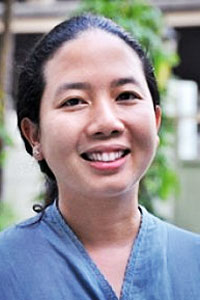
Soithip, an ethnic Karen-Thai woman from Bang Kloi in the Kaeng Krachan Forest, was among 22 villagers who were rounded up last Friday by state authorities and put behind bars at the Phetchaburi Provincial Prison. Returning to their ancestral land in the forest is a crime in the eye of the state.
It's appalling that after the arrest, they were deprived of their access to their legal counsels, while bail applications could not be filed on weekend.
When parents are in state custody, the children have to look after themselves.
"I am worried about my mum. I dare not tell my younger siblings that our parents have been rounded up. My younger twins were told that mum is away farming up in the mountains to produce food for us. Had I told them the truth they would cry a river," said Soithip's eldest daughter.
A large number of women in Thailand, like Soithip, have been evicted from their ancestral homes in the name of "conservation". Villagers who have been living and farming in areas subsequently designated national parks, are having their rights and customary practices curtailed. In the case of Bang Kloi, officials burned down their houses and rice barns in 2011 to force them to relocate.
When I met her before this arrest, she told me she wanted to live in her old place and to live a normal Karen life like other ethnic families. Since the initial eviction in 1996, she could not grow rice in the relocation site, or earn her living as hired labour. The meagre income made it very challenging to provide for her children.
Sharing the plight with Soithip are several ethnic women in Myanmar where violence against the people who are demanding democracy has escalated. Hseng Leun, an ethnic Shan woman is concerned for the future of Myanmar, especially people who live in the ethnic states along the Thai-Myanmar border, which has experienced decades of armed conflict.
"What the Myanmar Army are doing now is similar to what they have been doing to the people in Shan State and other ethnic groups over the past seven decades. When they descend to ethnic areas, the Myanmar Army has violated women's rights. They rape and sexually violate ethnic women. It is horrific," said Hseng Luen via phone call from the border.
The woman said the on-going armed conflicts have taken the heaviest toll on women, especially mothers. Her mother was married to a member of ethnic armed group. A wife of "blacklisted person", she was barred from going anywhere. Informants would report her to the authorities, when she set foot in the city. She recalls when her mother was pregnant, and her father was active in the battle elsewhere, like all other ethnic women, her mother had to deliver the child by herself and took care of herself and the newborn alone.
In Shan State, the Salween meanders through the middle giving rise to major tributaries including Nam Pang in the "thousand islands". The Salween is one of the last international rivers that continue to flow freely. Yet, investors from neighbouring countries, including Thailand and China, want to dam the river for hydropower projects.
Hseng Luen views that implementing development projects when Myanmar is yet a democracy will adversely impact the people, particularly women since their livelihoods are largely dependent on natural resources.
"If Myanmar is ruled by the military dictatorship again, the situation in Shan State will probably get much worse. With the use of force in the suppression, it is the people who will bear the brunt and it will cause a massive migration across the border into Thailand."
In Yangon, Ah Chai, an ethnic Mon woman human rights defender, is worried that the military coup in Myanmar may open the floodgates for a slew of large-scale development projects including hydropower.
She has heard that hydropower projects on the Salween will get the green light when people's voice is suppressed, and they have no right to participation.
"I was perhaps the first person to hold the placard that read "free flowing Salween" at a demonstration in Yangon. It matters most to me. The dams with adverse impacts on the people cannot be approved during this time, definitely not."
"We cannot allow more violations to continue. The education of ethnic girls has been decimated. I was born when the first putsch happened in 1988. We were left with no future, no information, no education, no economy. We have lost so many opportunities and we cannot let it happens again."
As the world celebrates the International Women's Day today, marginalised ethnic women are still facing structural violence while the mainstream society, deep in ethnic prejudice, endorses the violence.
The theme for 2021 International Women's Day is "choose to challenge", with a focus on calling out inequality. Ethnic and indigenous women in Thailand Myanmar continue to be marginalised by policies and plans carried out in the name of "conservation" and "development", whether its forced displacement through creation of national parks or hydropower dams' reservoirs.
It's time we challenge the structural violence and injustice faced by indigenous and ethnic women and stand with the women on the frontlines who are calling for a more just future, which recognises the rights and voices of the indigenous and ethnic women.
Pianporn Deetes is Regional Campaigns and Communications Director with Southeast Asia Program of International Rivers, a global NGO working to defend the rights of rivers and communities.
